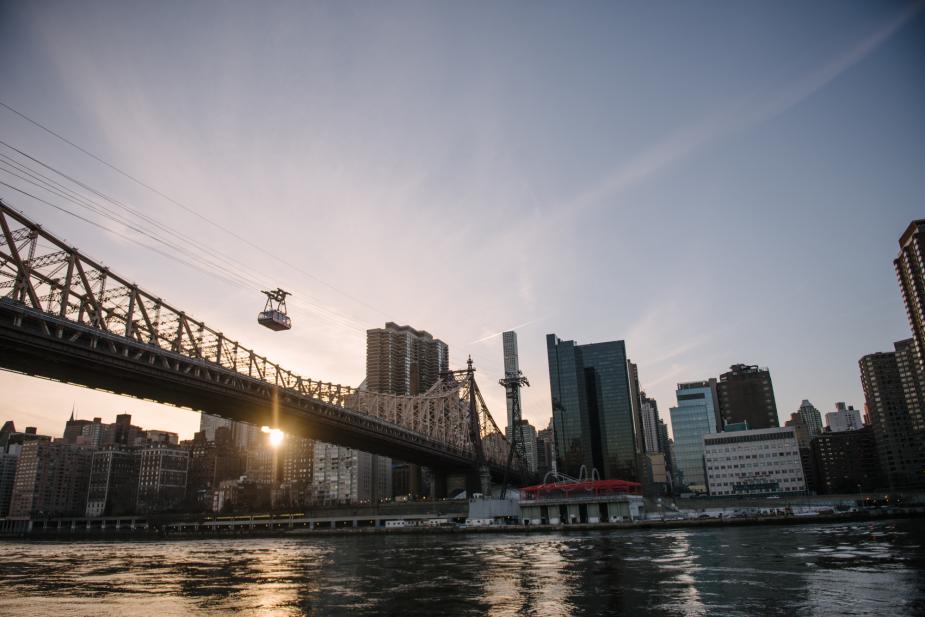Making Room for Community on Roosevelt Island

When a Samaritan woman came to draw water, Jesus said to her, “Will you give me a drink?” (His disciples had gone into the town to buy food.) The Samaritan woman said to him, “You are a Jew and I am a Samaritan woman. How can you ask me for a drink? Jesus answered her, “If you knew the gift of God and who it is that asks you for a drink, you would have asked him and he would have given you living water.”
John 4:7-10
Jesus surprises the Samaritan woman by approaching her. She recognizes him as a Jew, among those who look down on Samaritans, as they disparage them in return. Likewise, she is shocked that a rabbi, for whom having public contact with women is prohibited, asks her for help. Jesus is breaking taboos here; he breaks custom to make room for community.
I was raised in the heart of Illinois. My home is New York, where I have lived for 16 years. My apartment is on “Welfare Island” – so it was dubbed in 1921 – now known as Roosevelt Island. On its soil, that stretches almost two miles dividing the East River, was once a prison, a lunatic asylum, a charity hospital, a smallpox hospital, and a workhouse. Conditions were as bad as you can imagine, or worse.
The island became largely abandoned after new facilities were built elsewhere in the city. It was renamed Roosevelt Island in 1971 with a vision to make it a flourishing residential space, including affordable housing with special focus on accessibility for people with disabilities. This vision for the city, for the marginalized, was ahead of its time.
I may have never stepped foot on Roosevelt Island had I not met Ralph. He had been talking to people on Fulton Street, in Brooklyn, and asking for money. I assumed he was homeless. With a Bible tucked under my arm, feeling magnanimous, I asked, “Where do you live?” His eyes lit up: “Roosevelt Island. You take the F train to get there!” He was eager to jot down the directions for me on paper. I felt stuck. Was I to visit him?
So I was. A few days later I exited the island’s F train station and took the free red bus – reminding me of the neighborhood trolley on Mister Rogers’ TV show – toward the lighthouse. Next to it was Coler-Goldwater Specialty Hospital and Nursing Facility, where Ralph lived.
I was prepared to read the Bible and pray for him, as a matter of course. Yet he was insistent on leading the prayer. He prayed with fervor, “Lord, thank you for my friend who came to visit me.” I immediately felt the love of Christ at “friend.”
Here I thought I was bringing God’s love to this man, however Jesus was already there, for both of us. It was a significant moment for me as I realized that Ralph and I had more in common than I thought; we were both in need of “living water.” Luis, who later became Ralph’s helper and mentor, said it best: “People with disabilities are just like anyone else: vulnerable, looking for companionship.”
Ralph died in 2016. His prophetic voice and childlike spirit were unforgettable to me. The island remains, as does the history of thousands of people whose lives were spent there in the institutions. The island’s more recent ideals are veering closer to gentrification now, with less affordable housing and the poor clustered together, before they are forced to move.
Yet Roosevelt Island is still richly diverse and in its own way a refuge.
PRAY FOR ROOSEVELT ISLAND
Pray for the protection of those still living in long-term care facilities on the island, and against the spiritual strongholds or systemic issues that dominate their lives.
Pray for those who are lonely and isolated.
Pray for the amazing people, churches, and organizations seeking the social, cultural, and spiritual renewal of the community. Hope Church Roosevelt Island, Roosevelt Island Disabled Association, Do For One, and Open Doors are a few.
Pray that walls of separation between people with and without disabilities would come down, that we all learn to embrace the indispensable gifts and necessity of those seemingly weaker than us.
Pray that the hope of the gospel becomes the foundation for action rather than mere idealism, and that more and more people come to a saving knowledge of Jesus.
* * *
Andrew Oliver is the founder and director of Do For One NYC.
